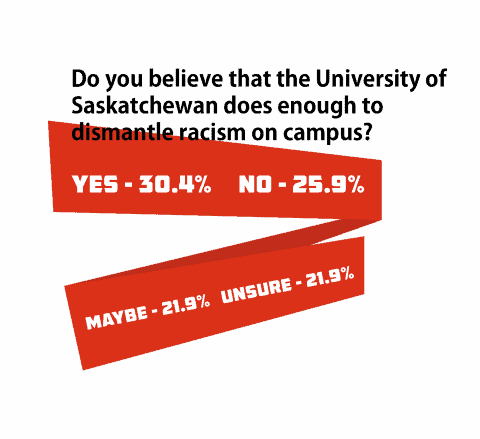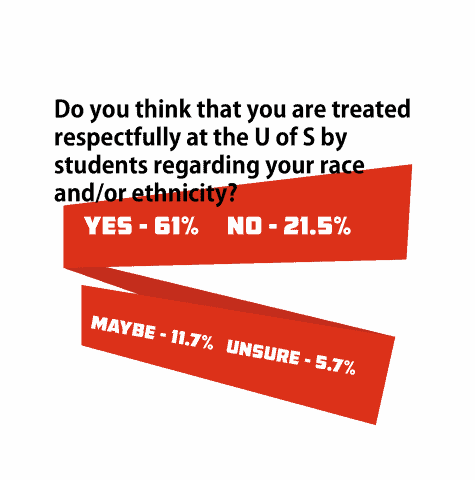Even though there have been strides in the civil rights movement, people of colour still face barriers in their day-to-day lives. I spoke with students of colour to better understand the varied and unique experiences they encounter at the University of Saskatchewan and in Saskatoon.
On Aug. 24, Nancy Eze, a third-year pharmacology and physiology student of Nigerian origin, and her friends went to a local restaurant where they were refused service and subsequently escorted out by the Saskatoon Police Service.
Eze believes she was a target of discrimination. She then took to Facebook to post a narration of the event in the hopes that the restaurant does not repeat this situation with another person of colour. Even after the incident, she has remained positive about people in Saskatoon, and she explains she was in the wrong place at the wrong time.

“This one experience shouldn’t change your opinion on the city. This land is a land of opportunity. It’s full of a lot of really nice people… It’s not like the entire city is full of bad people. In everywhere, you’re going to see the good, the bad and the ugly,” Eze said.
The Sheaf polled the student body to better understand their experiences with racism and the campus environment. Out of 245 participants, 196 students said they do not feel like they have been discriminated by the Saskatoon Police Service, campus Protective Services or any other law or security enforcement organization in the city.
Dakota Norris, a third-year management student of non-status First Nations origin, explains that he can only speak of positive experiences interacting with law enforcement.
“Most of the time, you know, you don’t get a job being a cop without getting screened for having a good character,” Norris said. “You know, I’m sure that some people slip through the cracks or over the years get a little bit jaded through their experiences, but in my experiences, everyone I know has been a fairly outstanding citizen, especially in terms of racism.”
After talking with several students, it became apparent that regardless of whether students were of the same race or ethnicity, they could still have varied experiences and opinions. The students I talked to had varied opinions on their levels of safety, the discrimination they encounter and the respect they receive from others.
Ana Sylvester, a second-year undeclared arts and science student of Indigenous origin, explains that she does not always feel safe to address her disapproval with racist remarks and has felt singled out by instructors to represent all Indigenous students during discussions in class.
“[It] depends on what kind of space I am in. If it’s just me and one other friend, then yeah… If I’m in a classroom with 300 other students, and I’m the only Indigenous person there, I don’t feel comfortable at all. Students share their experiences with racism on campus and in Saskatoon. That’s 299 against me, and that’s not a position [in which] I’d feel safe,” Sylvestre said. “If I’m in a safe and positive space, like the Women’s or Pride Centre, then I am very comfortable standing up for myself.”
Other students interviewed responded that they did not experience being singled out by an instructor, but some reported that they have felt excluded in lab projects or in group work. Minjin Oh, a fourth-year accounting student of South Korean origin, discusses his experiences with exclusion, which he believes were because of language and cultural differences.
“I tried to engage with [the other students], but it just didn’t work,” Oh said. “I tried to set up time to meet them at a place… I think because I am international, and I do know that everyone is aware that English is not my first language, … it makes me a little disappointed that no matter when I try to speak about my opinions, they get removed.”
Oh reports that he also received an antagonizing message from another student in the group hoping that he gets a poor mark. Oh hopes that, in the future, Canadian-born students might be more accommodating of international students, for example, by selecting project topics that highlight international themes.
There were mixed responses from students regarding whether they have felt that their intelligence has been questioned because of their race or ethnicity. The poll reveals that 91 students have experienced prejudice towards their intelligence because of their skin colour.
Kati*, a black student in her third-year of a science program, agreed that people often have preconceived notions about her intelligence because of her skin colour or the way she speaks.
“So I think that there’s this notion that, you know, when you speak English a certain way, then you’re all of a sudden seen as better or you’re more assimilated into Canadian society,” Kati said. “So when people say things like … ‘How did you pick up English so well?’ it’s assuming other countries in the world don’t speak English or that English is the universal language that everyone has to speak in order to be seen as intelligent.”
While talking with Kati, she expressed that she is always aware of her skin colour, and while she is proud to be black, she acknowledges that skin colour carries certain privileges and barriers. Kati and Sylvester both conveyed that although race is a social construct, it is important to confront racism and the effects it has on society.
The students I talked to had various racial and religious backgrounds, experiences and beliefs about racism. Mashrafi Haider, a second- year computer science student of Bengali origin, has not experienced racism, yet he admits that he would be unlikely to acknowledge the discrimination, as he focuses on having a positive mindset.
“I would also like to say that there are some people who would always like to put the racism tag on everything… Whenever people of minority face the same thing, [they] think that [racism] is the reason, so I don’t want to look at it that way,” Haider said. “To be honest, I didn’t face any racism after coming to Canada.”
Lukaa Jasem, a fourth-year environment and society student of Iraqi origin, explains that she has not encountered racism as an adult. However, she is often bothered when strangers ask her where she is from, which does not occur on campus but often in Saskatoon.
“When I’m working … and you tell me, ‘Where are you from?’ — it’s none of your fucking business where I’m from. Are you going to ask that white cashier next to me where she’s from? Then I’ll [say], ‘I’m from Ontario,’ and people would ask, ‘Oh, but where are you really from?’ … What are you going to gain knowing that I’m from Iraq or ‘X’ country?” Jasem said.
Just because racism is not expressed blatantly does not mean that it does not exist. Racism is covert and insidious and embedded in structures used to uphold a racial hierarchy, but as students, it is our job to critically examine our society.

Eze recently celebrated her third anniversary of living in Canada, and although she used to feel inferior not being white, she now believes that a positive mindset is the key to her successes. Eze was elected a student council representative during the 2016- 17 academic year and is the International Students’ Association president this year.
“For the first two years [in Canada], I kind of felt inferior. I felt scared and thought of what people are going to think of me coming from a different continent, a different culture, a different race,” Eze said. “I’m not going to lie, that’s the way your mind is going to go. [It’s] up to you to stand up… There are spaces for you in the community. Take it all, take up spaces.”
—
Nykole King / News Editor
All Graphics and Infographics by Lesia Karalash / Graphics Editor
Leave a Reply